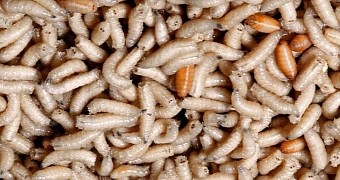Not too long ago, a team of doctors in China found several maggots living inside the body of an otherwise perfectly healthy man. To remove them, they had to cut into the man's skin.
Luckily, the intervention went smoothly and the maggots were removed without any complications. The man is now feeling much better and the specialists who treated him are confident that he will make a full recovery.
How the heck did the maggots got inside this man?
According to Daily Mail, this most bizarre incident happened in the city of Guangzhou in China's Guangdong province. It is understood that, before he started feeling ill, the man, identified only as Ma, spend 6 months working in Africa.
Experts believe that it was while on this continent that the man came across the maggots, which at that time were probably mere larvae. Without the man's realizing it, the teeny tiny creatures crept inside his body and set up camp right under his skin.
Having returned to China, the man soon enough developed sores and blisters. Besides, his skin kept itching, and on several occasions, he even experienced pain. When his local doctor failed to help him, he decided to visit a specialist at the Shenzhen Nanshan Hospital.
After closely examining his skin and also carrying out a series of tests, doctors here told the man that he had maggots living under his skin and that, to find and remove them, they had to cut into his body. Luckily, the surgical procedure was a minor one.
Information shared with the public says that, all in all, surgeons recovered about 20 maggots from inside the patient's body. When found, the creatures were all alive and kicking. Apparently, neither of them was too happy about being forced to leave home.
What species did the maggots belong to?
Specialists say that the little wriggly fellow found inside Ma's body were tumbu fly maggots. This species, whose official name is Cordylobia anthropophaga, lives in East and Central Africa. Unfortunately for Ma, baby tumbu flies are not shy about feasting on human flesh while in their larval stage.
Thus, wildlife researchers say that, after emerging from eggs laid on the ground by their mother, tumbu fly larvae go in search of a human or an animal to feed on. Once they settle on a victim, they simply work their way through the skin and camp in the tissue under it. Here, they keep busy feeding and growing.

 14 DAY TRIAL //
14 DAY TRIAL //